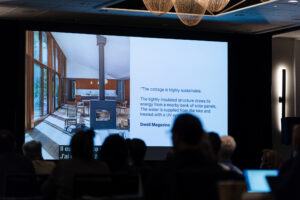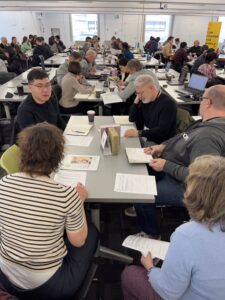National LCA Training Program
Projects Sponsor
Canada’s building sector is a major GHG emitter, and we need to put our houses, and all our construction projects in order. Their deep knowledge of these topics prompted NRC, RAIC, and Ha/f to launch nationwide in-person and on-demand Life Cycle Assessment training. Ha/f Climate Design designed and delivered a one-day course teaching practitioners to measure and reduce embodied and operational carbon using real-world tools and strategies. Workshops held in 10 cities over 12 months, alongside online modules, have trained over 1,500 professionals. This vital course has built capacity in low-carbon, climate-resilient design, showing building a greener Canada is, quite literally, a learning process.
Greening the Great White North means addressing Canada’s building sector which—largely due to the carbon embedded in construction materials and building operations—is responsible for a significant portion of our national greenhouse gas emissions. Making sure our building professionals have the skill-set necessary to make this green shift needs to be a priority for Canada.
Canada’s Greening Government Strategy mandates reduced carbon footprints in public infrastructure and Ha/f recognized that with the game changing many in the trade would need practical, accessible training in life cycle assessment for the built environment.
 Ha/f set out to design an educational program that would build national capacity in Life Cycle Assessment (LCA) for design professionals, provide both foundational online and in person hands-on training. The Ha/f team understood that equipping building sector practitioners with tools, strategies, and the regulatory knowledge they need to reduce embodied and operational carbon in their projects is key to a transition toward climate-resilient, low-carbon building practices across Canada.
Ha/f set out to design an educational program that would build national capacity in Life Cycle Assessment (LCA) for design professionals, provide both foundational online and in person hands-on training. The Ha/f team understood that equipping building sector practitioners with tools, strategies, and the regulatory knowledge they need to reduce embodied and operational carbon in their projects is key to a transition toward climate-resilient, low-carbon building practices across Canada.
Before launching the project, the team conducted a national scan of existing LCA training, policies, and professional capacity across the architecture, engineering, and construction (AEC) sector. This—thorough review of international best practices, emerging carbon standards, and the evolving requirements of Canada’s Greening Government Strategy and provincial climate policies—was foundational to their project. They also gathered feedback from practitioners, educators, and regulators to identify barriers to LCA adoption. Commonly these barriers included lack of technical knowledge, limited access to tools, and minimal integration into codes and procurement.
 All these findings were integrated into the design of Ha/f’s National LCA Training Program, a one-day, in-person workshop delivering hands-on Life Cycle Assessment (LCA) training grounded in real-world design scenarios. Ha/f led both the creation and facilitation of these workshops which were then delivered in ten cities across Canada over twelve months. Each session combined lectures, group work, and practical exercises using LCA tools, building assemblies, and policy frameworks.
All these findings were integrated into the design of Ha/f’s National LCA Training Program, a one-day, in-person workshop delivering hands-on Life Cycle Assessment (LCA) training grounded in real-world design scenarios. Ha/f led both the creation and facilitation of these workshops which were then delivered in ten cities across Canada over twelve months. Each session combined lectures, group work, and practical exercises using LCA tools, building assemblies, and policy frameworks.
To ensure relevance and impact, the Ha/f team engaged regional experts in each location to co-deliver the training, grounding discussions in local materials, climate conditions, regulations, and construction challenges. Partnering with local organizations and engaging regional experts helped localize delivery, boost relevance, and smooth some of the logistical hurdles a cross-country tour can encounter—shifting schedules, language needs, and venue availability.
Winter travel across Western Canada in February, snow in Vancouver and 40-below in Regina were all part of the fun. Following the success and demand of these in-person sessions, Ha/f then developed a free, 12-module self-paced online course to expand access and scale the training nationally. This on-demand course mirrored the workshop content, offering foundational knowledge in embodied and operational carbon, circular design, and carbon modelling. The content, presented in this format, empowered thousands more practitioners to apply LCA principles in diverse Canadian contexts, without the eager participants having to leave their desks.
Varying levels of LCA literacy and digital fluency across participants—from seasoned professionals to students—make designing content that’s both accessible and technically robust. By building layered content, offering foundational concepts first and deeper technical dives later, and incorporating diverse learning formats—videos, case studies, exercises— the Ha/f team was able to share with the whole class.
 To date, Ha/f’s National LCA Training Program has already trained over 1,500 professionals across Canada—equipping the AEC sector with the knowledge and tools needed to reduce embodied and operational carbon at scale. This work directly supports Canada’s Greening Government Strategy and is actively influencing real-world projects and procurement.
To date, Ha/f’s National LCA Training Program has already trained over 1,500 professionals across Canada—equipping the AEC sector with the knowledge and tools needed to reduce embodied and operational carbon at scale. This work directly supports Canada’s Greening Government Strategy and is actively influencing real-world projects and procurement.
Merging technical rigor with accessible, design-driven learning, tailored specifically to Canada’s diverse climates, materials, and regulatory contexts, this is the first national training program to combine hands-on workshops with a free, open-access online LCA course.
 By engaging regional experts, using real case studies, and offering flexible delivery formats, the program is both scalable and adaptable. It serves as a replicable model for other countries or sectors looking to accelerate climate literacy in the built environment.
By engaging regional experts, using real case studies, and offering flexible delivery formats, the program is both scalable and adaptable. It serves as a replicable model for other countries or sectors looking to accelerate climate literacy in the built environment.
Ha/f’s National LCA Training Program is building capacity in low-carbon, climate-resilient design in Canada’s building sector by giving design professionals the tools they need to turn our blueprints green.













